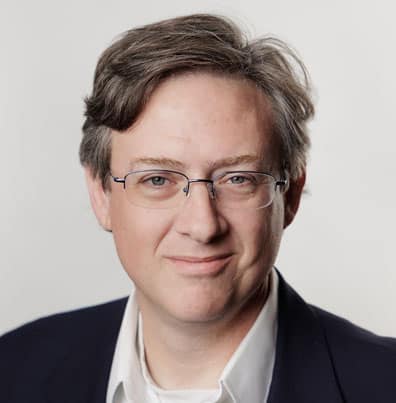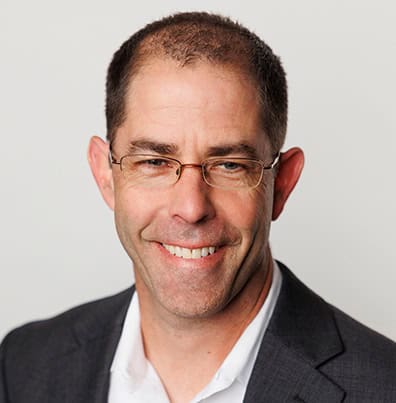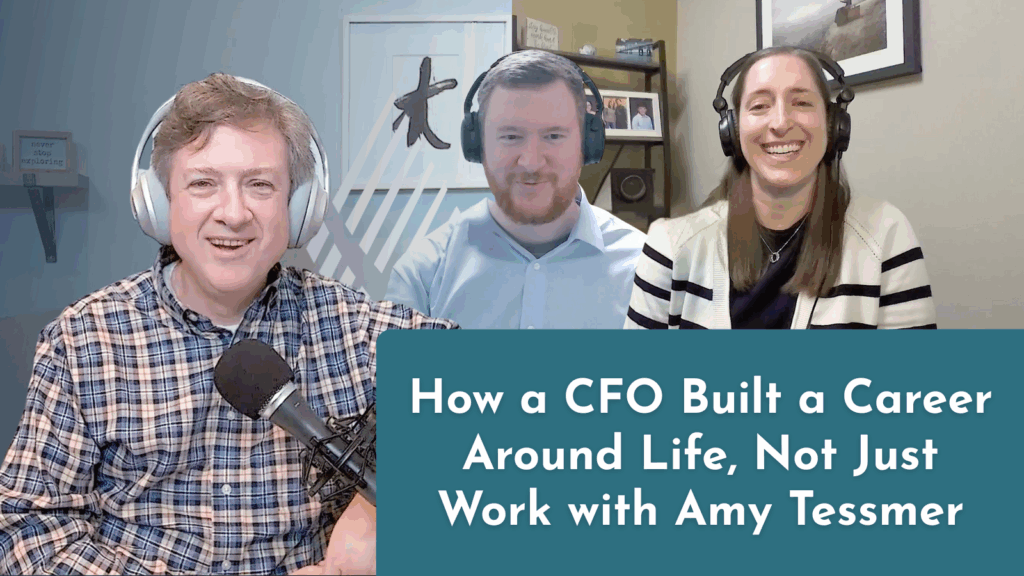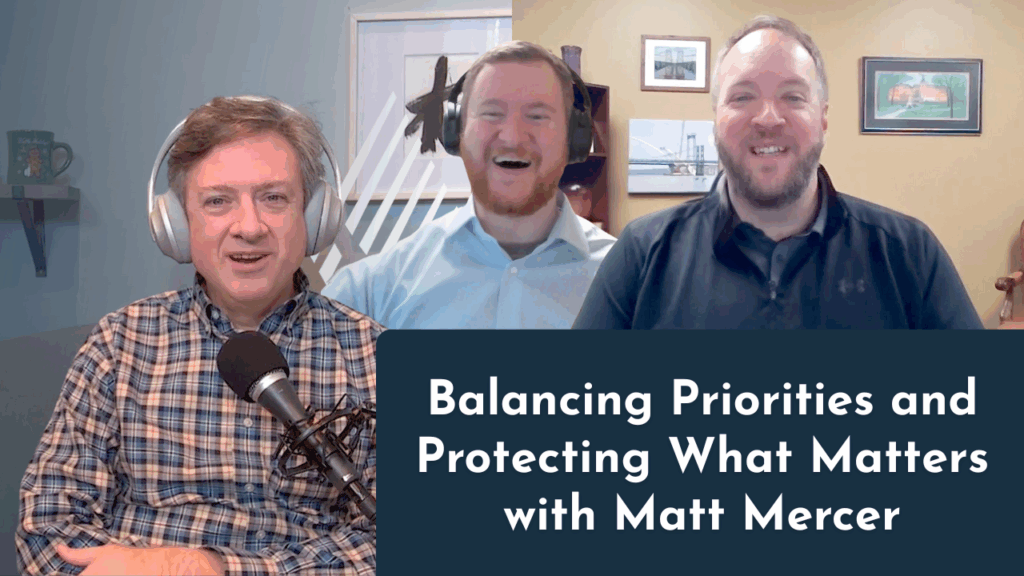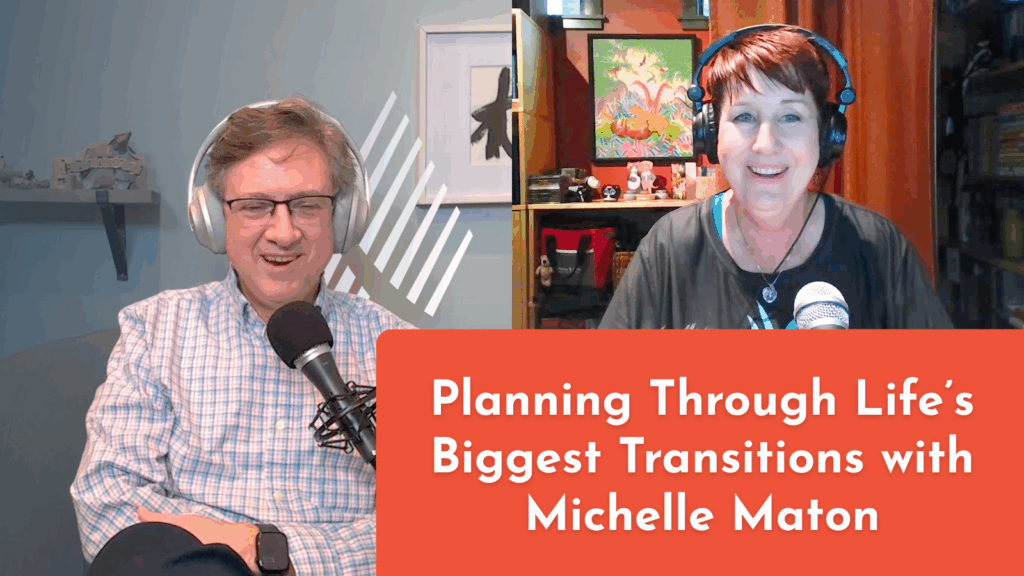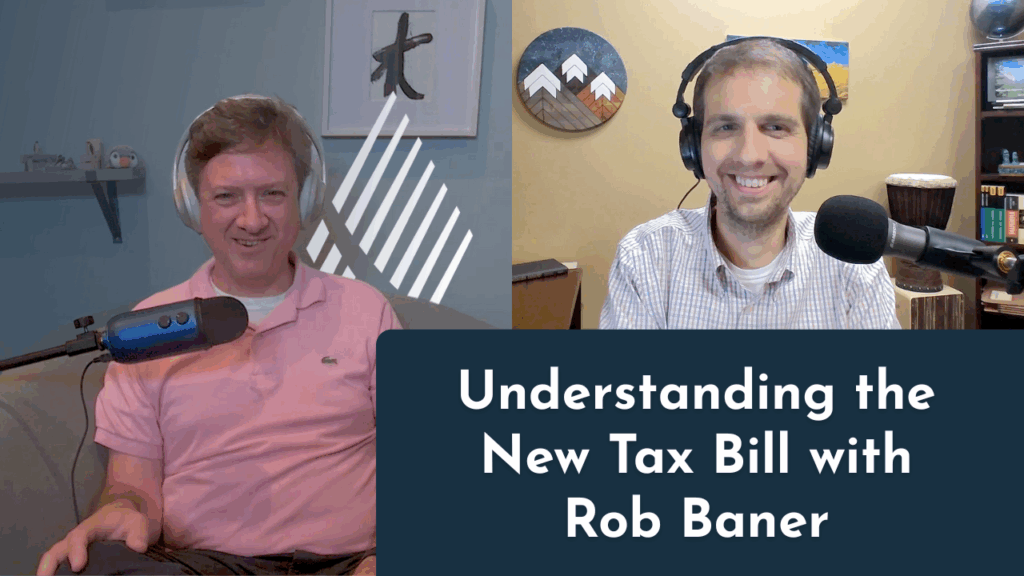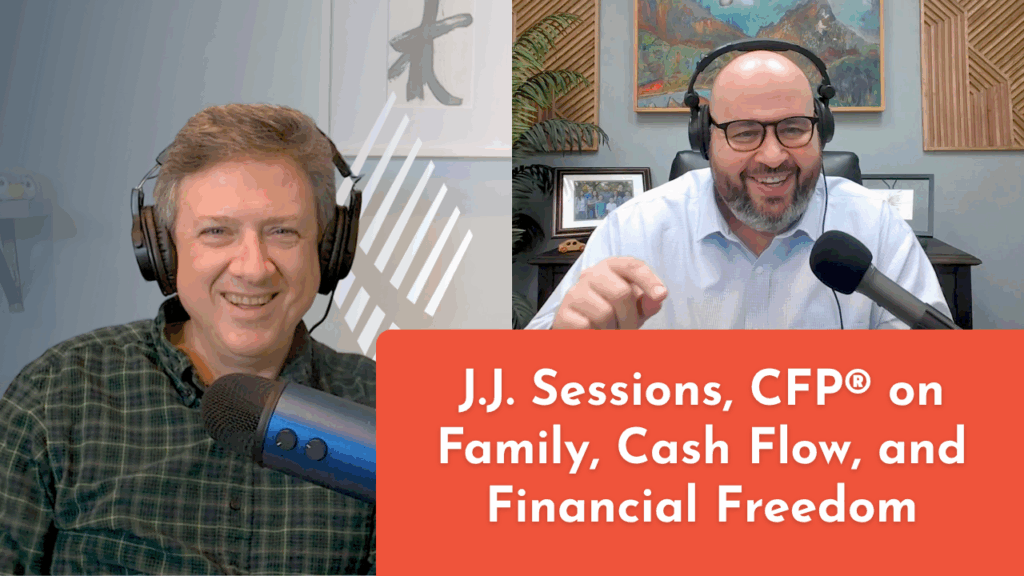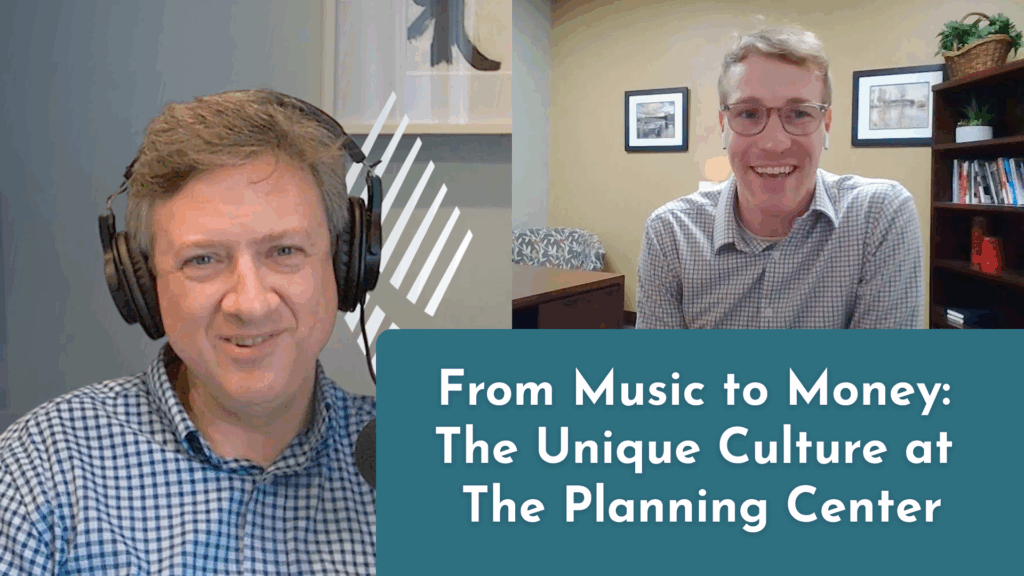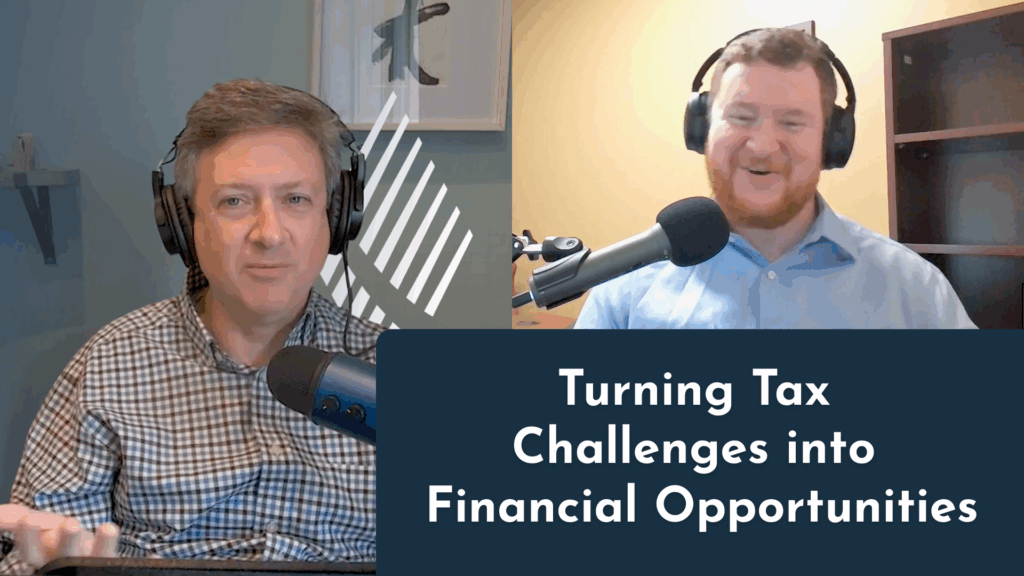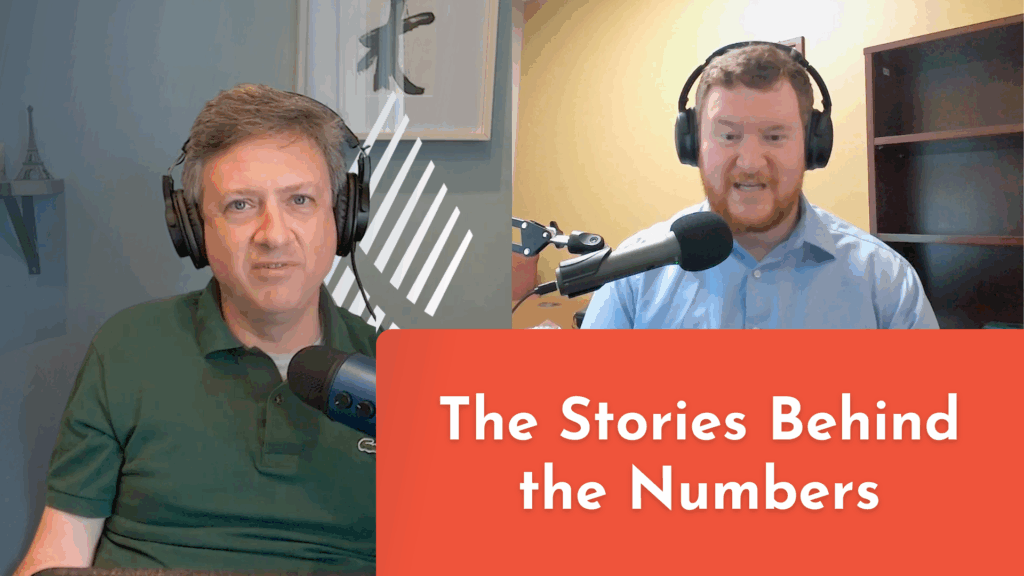[00:00:00] Intro: Every number on a balance sheet tells a story, late nights spent building something meaningful, the risks taken, the difficult conversations, the lessons learned along the way. But true wealth is not measured in dollars. It’s woven into the stories that we create, the experiences that shape us, and the memories that outlive us.
Welcome to the Living Beyond The Numbers Podcast with Jude Boudreaux from the Planning Center. This show is not about spreadsheets and financial jargon. It’s about real conversations and powerful stories that help you align your money with your values, your dreams, and your legacy. Because at the end of the day, it’s not about how much you have, it’s about the life you want to live and the stories you leave behind.
Now onto the show.
[00:00:50] Jude Bordeaux: Hi everybody. Welcome to another episode of The Living Beyond the Numbers podcast. I’m your host, Jude Boudreaux, and I’m here today with our director of Positivity, Caleb [00:01:00] Irvingdale. Hello and yeah, and we’ve got a special guest here today, Eric Keys, who’s the CEO of the Planning Center.
So welcome Eric. Hey, thanks for having me. Yeah, so along with being CEO of the planning center, Eric is somebody that I’ve known and has been a good friend for, um, probably almost 20 years now. So, been a few miles down the road. So, um, it’s been pretty neat to see where the firm has come to this point. So, um, yeah, looking forward to hearing more of you sharing about that and, um, the firm and how it’s kind of evolved to get where we are.
[00:01:35] Eric Kies: If I’m remembering correctly, you and I, it was next Gen FPA next gen Yeah. Up in, uh, Minnesota.
[00:01:41] Jude Bordeaux: Is that right? Yeah. So that would’ve been Fpa a Next Gen, and that would’ve been a year after Katrina, which is kind of my benchmark for things here in New Orleans. So it would’ve been in 2006, so 19 years. Cool.
Yeah, it’s been a little while, but, uh, it’s a lot of good things that come in the, you know, through that time. So, um, so yeah, [00:02:00] maybe as a start, I mean. You know, one of the things we always begin with is kind of like, how do people get here when they’re part of the firm? So yeah. How did you come to be part of the planning center?
[00:02:09] Eric Kies: That’s kind of an interesting story. Um, so I started out, um, in college studying engineering quickly figured out that that wasn’t for me and was taking, um, some macro and microeconomics and it was like, Hey, this comes really, really easy to me. So it was kind of a, just a process of self-discovery that led me to the industry, but I moved up.
Um, to the Quad Cities after I got my MBA and started out at, um, it was American Express Financial Advisors, um, back then, now it’s Ameriprise and joined the Financial Planning Association. And, um, we show these, uh, FPA meetings and met this guy named Marty Kurtz. And so we’d show up at these quarterly meetings and we just got to be really, really good friends and, and we’d stay after the meetings and, and talk and [00:03:00] talked a lot about life, sometimes about financial planning, a little bit of both.
And, and over the course of about three years, I decided I was gonna go start my own firm. And Marty was the only person I knew that had done that. Um. I called him up and said, Hey, if I buy you dinner, can I kind of pick your brain? And and he said, absolutely. So we’re, we’re sitting there having dinner and I just kinda said, Hey, I think I was hardwired to kind of be independent, to be a fee only financial planner.
And you’re the only person I know that’s kind of gone down this road. And, and he’s like, Hey, I’ll show you every tool. Template process, show you everything I got, help you any way I can. But he’s like, you’re not from here, right? So you have no natural market. At the time I was, I was young and still had hair, right?
And it wasn’t gray. So he is like, this does not help you. You, you, you’re not gonna make any money for five [00:04:00] years. You’re not a wealthy guy. And I’m like, where’s my pep talk? I thought you were gonna say go get him kid. You know? Um, but he, he said. Quite frankly, I’m growing very quickly and could use some help.
So if you just want to team up, let’s see where, what we can do and where we can take this thing. And so that was. That was in early 2004. So I landed at the planning center in 2004 in the fall, and yeah, we just started building from there. So I was the second CFP, uh, Matt Sson, who I believe has been on the podcast already, um, he was here as well, he was working on a CFP.
And so like the, the planning center as far as like the Moline office, um. Yeah, we just started building in 2004 and um, it’s been kind of a pretty cool trip, but that’s how I landed here. Yeah,
[00:04:50] Jude Bordeaux: right. And so from, you know, from that day on, uh, you know, I mean, it’s a pretty small company at that point, so, you know, what were things like, how are [00:05:00] y’all, how are you putting things together?
[00:05:02] Eric Kies: It became apparent to me very, very early that. Marty was absolutely incredible with people. He just had that thing where, um. He could connect with people like he just had instantaneous kind of rapport with them. Remind me, a lot of you, Jude, just when you, when I see it, kind of work with people and talk with them, just could really, really connect with them very quickly, but.
I felt like the value that I could bring to the firm, especially in those days was, was just kind of organizing things, really kind of managing the practice and then letting, uh, Marty and Matt, uh, be the. Primary, uh, relationship managers with, uh, with the clients and just work with the clients. And I, I just started building stuff in, in the, in the back office, so to speak.
So I kind of took [00:06:00] over some of the operational and business management stuff. And, and Marty and Matt were really, um, the main kind of client facing financial planners back in the day. Um, but it was cool. I mean. There wasn’t a lot of systems. I mean, Marty had some stuff, but it was a very, very young company.
So like we would go and make lists of everything we wanted to do and we’d, we’d, we’d come back and just knock it out, you know? So it was, it was a pretty cool, creative environment at the time. For sure.
[00:06:29] Caleb Arringdale: Just before this, we were talking about your other pursuits started off as an an engineering school guided MBA.
You’ve done triathlons, you’ve always clearly had a drive to push forward. Is that, do you think that’s what really helped you jump into that business business manager role?
[00:06:47] Eric Kies: Yeah. No, there’s, I mean, there’s always been a, a thing of, um. If I just look at, uh, kind of my personality, um, there’s a thing there of being able to [00:07:00] work fairly hard for long periods of time, often independently.
Um, also as a team and just to try and make things better. I don’t know if that’s from growing up on a farm, you know, in, in Iowa, just growing up and taking care of stuff, you know, and if there’s. 40 acres of beans that needs walk. Well, guess what? Yeah, just keep going until you get it done. Um, so yeah, there’s, there’s a kind of a thing there of just hard work and, and taking care of stuff and a little bit of teamwork and
[00:07:30] Jude Bordeaux: Yeah.
Yeah. Totally. Well, I was hoping you’d share. Um, you know, I feel like one of the stories that I think of a lot and I share with even our new. New team members is about, you know, and I’m already telling you to go and do what Eric’s do. So, uh, maybe you can tell us a a little bit about that.
[00:07:48] Eric Kies: Oh, yeah, well, yeah.
It kind of relates to that, to that business manager part, right? So I, I mean, it was like the first day or two and I show up and, you know, I’m [00:08:00] a young energetic C-F-P-M-B-A. I’m like, all right, what do you want me to do? Yeah, what, what, what do you want me to, to go after here? And he is like, uh, I don’t know.
Just, just look around and do what Eric’s do. And I’m like, not helpful. Um, so, but yeah, no, and that’s, that’s what led me to the business manager, uh, and, and, and kind of the practice management side of things. I’m like, okay, well he’s, he’s really great with taking care of people. I’ll just start building stuff around him as fast as I can, um, just to support him and support Matt and just build stuff so that way we can take care of more people.
So that, that was it. It was like, and you know, there’s a little, there’s a lot of genius and a lot of things that Marty did, like that’s one of ’em. Like, what do you want me to do, Marty? I don’t know. Just go do what Eric’s do you know? Which you would never find that, like in an HR training class, right. It’d be a job description and you’d write out the roles and the [00:09:00] responsibilities and you, you detail everything out.
You’d just be like, I don’t know. Just look around. Go do something and add some value to people. Be in motion. So that’s it. Yeah.
[00:09:12] Jude Bordeaux: Um, I tell that to most of our new team members when they come on that, um, you know, that we, you know, a little more structure around there. You hired to be a financial planner. We got some things that, that are sketched out for you to do, but mostly we’ve hired you to be who you are.
Right? So, you know, Julia’s new here in our office in New Orleans, so like, do Julia’s do, like, there’s things that have to get done, but we hired you for you, so let’s. You, you bring yourself into this and let’s do it together and figure out what works. So it’s, um, it’s a fun environment when that can happen.
[00:09:42] Eric Kies: Yeah.
[00:09:43] Jude Bordeaux: Yeah. A hundred percent. Tell us now, I mean, obviously it’s a long ways from when you started there and, um, you know, you still find yourself doing what Eric’s do. So what’s, tell us about your current role. Like what’s, what’s that look like now when you’re look at where your, where, where your seat is at the planning center.
[00:09:58] Eric Kies: Yeah, yeah. No, I mean, [00:10:00] we’ve grown a lot. It’s a much more complex organization than it was, uh, much, much larger. Than it was. Um, you know, so one of the things that, uh, Marty and I talked a lot about is, you know, he and I and Matt were sitting around and, and there was an article about a law firm here in town that I wanna say, they were celebrating their hundredth anniversary.
And he’s like, Hey, keys, wouldn’t it be cool if we, if we build something that 50 years from now, there’s an entirely different generation of planner working with an entirely different, different generation of client. And so there’s this idea of sustainability. And that, so it wasn’t about building a huge company.
Um, it wasn’t about, you know, working with massively wealthy families, but it was, it was very much about building a sustainable business that, you know, it wasn’t, it wasn’t about Marty, it wasn’t about Matt. It wasn’t about me. It was about building [00:11:00] a place that people could come into. That, um, that they could, they could work with us as long as they wanted to be here, that, that they could, they could bring their family to, and there’d be somebody beyond us, you know, that.
Whether it’s their kids or their grandkids or even their parents, you know, that they had a safe place to come in and talk about life, to talk about money, to, to kind of navigate the various transitions. Some, some really positive and some really, really hard, you know? Um, but it was about building something way, way beyond ourselves.
[00:11:37] Jude Bordeaux: Yeah. And you know, that’s part of the language we use to this day that, uh. You know, 50 years from now we’ll have another generation of advisor talking to another generation of clients. But it’s the same principles, the same values that, you know, that lead us and that, you know, often that I see lead our, the families we get to work with, um, often, somewhat jokingly say, you know, [00:12:00] some of our, our clients, many of our clients who you know are financially wealthy came that way ’cause they were pursuing an idea like they’re pursuing something that was important to them, not.
Uh, not the money. The money was a byproduct and, um, and it’s pretty exciting to see us live through those values and grow a business. So, um, so yeah, I mean, I guess you give just like a little framework of the scope of the business for somebody who might be listening.
[00:12:26] Eric Kies: Yeah. You know, so we’ve, we’ve got, uh, several different departments.
So what, what we’ve been working on building is as the, as the organization got larger. You know, we went from just the Moline office to, you know, multiple offices and, and we transitioned to an organization where, um, it consists of departments and there’s a management team to run it. And, um, that way the planners, you know, people like you, Jude, you [00:13:00] know, you can primarily focus on just taking great care of clients, helping ’em out, and being there for them, you know, so you don’t have to worry about, you know, the trading, you don’t have to worry about billing on accounts, you don’t have to worry about benefits.
You don’t have to worry about any of that stuff, right? You can just sit there. And meet with people and take great care of them. Going back to kind of that idea of people having a safe place to come in and talk about life and money, you know, you just, you can focus on having that, having those conversations and, and, and creating that environment so you can kind really, really focus on that.
And so what’s evolved is we’ve, we’ve got this relatively large. Company. We’ve got a, a planning department, we’ve got a tax department, we’ve got an operations department. Um, and we’re working on building out that next [00:14:00] generation of financial planners and advisors, right? So we’ve got, we’ve got a group that’s roughly my age, give or take 10 years, right?
And so now we’re starting to build out the next generation beyond them. Um, ’cause our founders, you know, Marty Kurtz and Cicely Matan and John Longstaff, um, yeah, the, the G ones, I guess technically Jude, you’re a G one ’cause you had your own firm when you merged in. But, um, the G ones have retired, so we, we are two.
The third generation in, in the firm, um, and starting to even work on the fourth generation of planners. So that way, again, the idea is that, um, we’re trying to build out something sustainable, you know, so that way, um, clients, they can stay here for the long run and they can bring in their families and we can take care of’em.
[00:14:54] Caleb Arringdale: So, something we’ve talked about recently is the idea of like an ensemble practice versus like a [00:15:00] siloed practice. Um, would you wanna briefly explain kind of what that is and how we’ve chosen the ensemble practice?
[00:15:07] Eric Kies: You know, in the industry a. Very, very broadly speaking, there’s often, um, like what, what we would call a solo practitioner, right?
So there’s, there’s one advisor, you know, and they, they will have an assistant or a staff person or two that helps out with some of the administrative things. Um, and what happens is they kinda hit a ceiling of complexity, so to speak. They can only work with. 85 people or a hundred people or whatever. And then, then they’re kind of maxed out.
They can’t take anybody el sound, they can’t help anybody out. They’re, a lot of times they’re swimming and work. And so oftentimes what they’ll do is they’ll, they’ll team up with, with another person or two. Right. And they’re, they’re starting to share, share expenses. Maybe they have, they, they lease an office together or they, um.
They hire a couple of people together and they’ll, they’ll share, you [00:16:00] know, share an administrative person, so to speak. But the reality is, is they’re, they’re operating as silos, meaning that, you know, Jude would have his clients and I would have my clients and, and Caleb, you might have your clients Right.
But we’re, we’re sharing. Resources to lower our overhead, but it’s really three independent or silo practices, um, kind of pooled together. Um, well the next evolution of that is what we’ve been working on building literally for almost 20 years now, which is an ensemble practice where, um, the clients are clients of the firm.
And we’re really committed to having the right person in the room when needed. Um, that we all kind of collaborate, we work together, you know, um, and we, we truly try and function, um, as a unit and a team to deliver whatever the client needs to the [00:17:00] extent we’re able to.
[00:17:01] Jude Bordeaux: Yeah, it’s, um, as somebody who was a solo practitioner and then, you know, became part of the ensemble, I’ll say it’s, you know, it’s really freeing in a lot of ways because, um, you know, if I have clients who are looking, you know, like, we’ve got problems we can solve, maybe they’re looking for a little bit of a different experience, then I, you know, I team up with Matt Knoll, who’s one of our partners and senior planners and bring him in the conversation.
Um. On calls this week, I’ve had, uh, Julia, who’s new in our team here, Caleb or Rob from the tax team. Um, so you know that we get to work together on this and not alone to serve the people that we get to serve is, um, really one of the most fun parts, I think, about the work that we get to do.
[00:17:46] Eric Kies: Yeah, and I will say it, it is a really significant mind shift though.
Um, you, you have to be committed. To doing a lot of interior, what I would call interior work or self work. [00:18:00] Um, because you have to give up a lot of control, right? You, you have to constantly be thinking about the client and the team and how do you, how do you collaborate? Really, really well. You have to buy into the, that it’s about something bigger than yourself.
Um, and that, yes, I’m gonna, I’m gonna make these sacrifices because I believe in the bigger picture story and what we’re trying to create together in the service of something. Beyond ourselves and even beyond the existing client base, there has to be a bigger picture, bigger picture vision in mine there.
Um, ’cause it’s, it’s not easy to do.
[00:18:51] Caleb Arringdale: One of the other partners here says that you’re the, you’re the master of mental jiujitsu that you’re great at helping us take like this. [00:19:00] Perhaps more insular approach and then expand it and help us see, oh no, if we do these things, yeah, we can build something that will outgrow us.
So I, so I’m, I’m relatively new, obviously to the planning center, only been here five years, but when I came on, it seemed like this was a fully developed idea. But now when you see all the work that’s gone into that to make this work and how we all have to continue to push it forward, it’s, it’s, it’s a cool thing to see.
[00:19:24] Eric Kies: That’s funny. I don’t think I’d heard that before. That’s, that’s, that’s a funny thing. Um, yeah. No, and I honestly, I think that’s one of the, the more challenging aspects of it, Caleb, is that, um, a lot of times you are working on very conceptual, esoteric things that are not, nothing’s tangible. Right. Right.
You’re, you’re, you’re trying to take, take like our annual company retreat that we do. Yeah. That Caleb’s the sheriff of, right, right. And so like, we come together once a year, we bring everybody in the company together that can be here. [00:20:00] You know, some, and sometimes somebody can’t, you know, they, they’re, they’re getting married, they had a baby, you know, they got life happens, right?
And they just can’t do it. And that’s totally okay. But everyone else is there and it’s, it we’re never working on like, Hey, how do we make this one business process work better? We’re working on things like. Communication. We’re working on things like how do you operate from a strengths-based environment.
We’re working on a lot of concepts that will take a lifetime to master and, and there are very, very few people that would invest that kind of money. To work on building out what a lot of times is called the soft skills, which I think is hilarious ’cause it’s the hard stuff to do, but to build out those soft skills simply to make a, a better culture and a better environment so that way we can serve clients for 20, 30, 40 years in their families.
There’s [00:21:00] a lot of things we do like that, like the monthly circle meetings that we have. You know, investing in coaching for employees that no one else would ever think to do or invest the, the, the money into, but it’s all so that way we can become better versions of ourselves so that way we can serve these people more effectively.
That’s a very esoteric, conceptual thing, but it’s just how we roll and how we are.
[00:21:31] Jude Bordeaux: Absolutely. It’s, um, I mean, one of my favorite things is somebody who gravitates towards that kinda stuff in general. Yeah. But it’s, I mean, it’s always ongoing. You know, we’ve got, you know, a bunch of business partners.
There’s about a dozen of us that, you know, own the planning center here, and we’re all different people. And so there will, you know, at times you can operate really differently than, you know, Amy, who’s our CFO. Naturally comes from a very different place, uh, around things than I do. And that can create, uh, [00:22:00] friction.
And that’s something that, you know, she and I had to learn about and how to work together in that we’ve invested that time and worked on these things has, you know, really strengthened that relationship so that there’s so much trust there. Um, that, you know, if Amy brings forward something, um, I know where she’s coming from and I know who she is and that, um.
We’ll figure that part out together. And, um, same thing from, from my standpoint, if I say something that’s a little, a little out in the outta left field for somebody in her perspective, she’s gonna listen through it, think about it, and we’ll work on it together. So, um, I just find it so valuable that we invest so much into each other
[00:22:43] Eric Kies: the way that we do one of the foundational books that, uh, Courtney Poland, who was my.
Coach for, for a long time had me read was, um, the anatomy, A piece from the Arbinger, uh, the Arbinger Institute. And I was at [00:23:00] an arbinger workshop and we were, we were talking about, um, kind of some of their concepts, some of their tools, some of the ways to have these, these, these discussions and. There’s a pastor from a inner city church and, um, you know, he is talking about it and he is like, you know, there’s, there’s a saying, um, like, are we cool?
Right? And, and it’s like when there’s conflict and, and we work through it, like, are we cool? Right. And he’s like, a lot of the things that, that we work on. Here at the planning center help us get to a spot where we can have those conversations because things aren’t gonna be cool at times. When you, when you put together a bunch of really successful, intelligent, driven people that care, there’s gonna be issues, there’s gonna be conflict, and so what we need are these [00:24:00] qualitative.
These qualitative things, these ways of being, these, these, these mindsets. So that way when things aren’t cool, we can, we can way wade through the discussion, wade through the challenge, get through the conflict to a spot where we are. And I think that’s one of the unique differentiators because there’s all, there’s gonna be challenges, there’s gonna be trouble.
Right, and that’s part of the reason businesses unwind or fail is because they, they don’t invest in these things, right? They, they make it all about the quant. They make it all about the growth rate. They make it about the, the profit margin. They, they make it about what’s the, what’s the net net income flowing through?
Not about how do we, how do we communicate, how do we deal with this stuff?
[00:24:50] Caleb Arringdale: Which I think really is this profession, when it’s done best, is all about that. Obviously we think we live in a world now where [00:25:00] ideas like AI are becoming more and more popular and, and AI is getting better and better at some of those quantitative aspects of this.
But it’s the qualitative aspects of this job that are so critical and something I think we continue to invest in, which I think prepares really well for the future.
[00:25:17] Eric Kies: Yeah. Yeah. And I mean, I think a ai, like a lot of, um, significant historical trends, it’s an amazing tool. We just gotta figure out how to use it, how to use it well, how to use it safely, um, how to, how to keep everyone’s information, you know, secure, things like that.
Um, but what it does is if we use it well. It creates the capacity to go do what humans do best, which is to sit in community with each other and, and help each other through stuff, you know? Um, that’s what we’re great at. [00:26:00] There’s sitting there with, with somebody who’s going through something really, really hard and connecting with them and helping them navigate that.
A computer can’t do that. It can tell you all the technical things that you probably need to do. Great. Awesome. You know, but just that being able to resonate with, with another human being and helping them, helping them get to a new spot. Only we can do that.
[00:26:30] Jude Bordeaux: I think it’s very much the heart of, of us and what we do.
Um, in thinking about, uh, this with a recent client, um, yeah, I mean we’ve gone through challenges of losing, uh, losing their life partner and. Uh, the delights of having a grandchild and how do we navigate those, uh, you know, those different things like all of life from, uh, it’s the whole catastrophe, right?
I think is the, was Marty saying. [00:27:00]
[00:27:00] Eric Kies: Yeah. That, that actually came from our old friend, ed Jacobson. Yeah. Um, is, uh, he was a psychologist that had come in and, uh, uh, done some work with the planning center and I forget, I forget where he got that term. Zorba is the name that comes to mind, I forget. But like he talked about the full catastrophe of life, which, um, he’s talking about the good, the bad, the ugly, just everything, you know.
Um, but uh, yeah, that’d be a fun rabbit trail to go down another time. We’re coming
[00:27:28] Jude Bordeaux: upon time, so we’ve got a few rapid fire questions that we like to start to wrap up with. So, um, first is, what is your favorite animal?
[00:27:39] Eric Kies: Huh? Not sure I got a favorite animal, but I was recently watching, I think it was a National Geographic, uh, show, I think something like that.
Um, but they were, um, it was super fascinating. They were talking about, um, orcas down at, uh, I believe at the, um, in Antarctica. Um, [00:28:00] and they had all, they had learned all these new different hunting strategies that no other orca had. So I thought it was just a really, really intriguing, um, thing just to see how they worked together, how they learn, um, and how they had kind of evolved and figured out new strategies, new new ways of going about things.
So it was pretty cool.
[00:28:25] Jude Bordeaux: Yeah. Nice. Uh, so. Is there an item that you think is always worth spending more money on?
[00:28:33] Eric Kies: I would go ask somebody that I knew, like one of the pastors at church, or um, somebody in the community to think of somebody that they knew needed something, preferably a kid, and I would give some money to go do that.
Whether that kid needed a jacket for the winter pair of boots, maybe they don’t have a bed, whatever it is, [00:29:00] like, here’s a couple hundred bucks. Go help some kid out. That’d be the first thing I’d do if I had to go spend it. I would find something that meant something to my son or my daughter or my wife that we could go do together.
So whether that’s taking my daughter to Starbucks and getting whatever fruity, sugary drink she wanted to do and then have her torture me with Taylor Swift songs while we drive around or, you know, go into the batting cages with my son or, you know, whatever it is. Um, but I’d probably just go spend a, spend a few bucks and go spend some time with my family.
[00:29:45] Jude Bordeaux: Nice that tracks for, again, known each other for a long time. I know that’s kind of how it goes. I always think about you when my razors are getting a little dull and I’m like, is it, is it dull enough that Eric would throw this out yet?
Most of the [00:30:00] time I switch it before I think you really would.
[00:30:02] Eric Kies: Yeah. Well that’s okay. There’s no, you know,
[00:30:03] Jude Bordeaux: suffering’s optional. Jude. Right. Um, cool. So, um, so on that line, like it is there. You know, the thing that comes to mind when you think about, you know, the best money that you’ve ever spent
[00:30:18] Eric Kies: as we’ve built out, like career tracks at the planning center.
You know, um, I would say the best money I ever spent was I invested in myself, whether it was going to grad school, whether it was studying for my CFP, whether it was joining the F-P-A-I-I, the best money I ever spent was investing in me. I love that.
[00:30:40] Jude Bordeaux: So I know you, I know you well enough to know, I think this is gonna be a challenging one, but talk about the last achievement that you celebrated and how’d you celebrate it.
[00:30:49] Eric Kies: This will give everyone a little bit of, a bit into my psyche, so I’m much more, uh, willing and eager to celebrate like something the kids did than something that I did. Right? So, um, but if [00:31:00] I make the assumption that it’s, uh, something that I was directly involved with, um, yeah, I would say, um. Helping, helping the founders of the firm retire.
Say a little more about that. So the independent advisory space, like these, these are people that left, you know, a large broker dealer, a large insurance company, went out totally on their own, created their own entity, um, to, to take care of people. They’re rugged individualists, right? Um, you know, I, I think about, for example, Marty, he went out on his own.
I, I know all the hard work and sacrifice that he went through to get this thing started to build. It just poured his heart and soul into this company and to clients for, for his entire career. So, to, to, to take the planning center. Just through a [00:32:00] lot of, of effort from a lot of people and get the entity to a spot where he could, he could retire and he could transition the business to to us, and clients are totally taken care of.
He’s taken care of. All the employees are okay. Um, and that he can go spend time with his kids and grandkids and do a bunch of volunteer work and kind of figure out the next phase of his life. That’s a pretty cool thing. Yeah. Um.
Yeah. And so even, you know, you think about Sicily and, you know, being a woman in downtown Chicago and forming her own RIA firm, you know, very much in a male dominated industry, and getting to a spot where she felt okay retiring, you know, or Nancy Blanc up in Alaska.
Kind of a similar thing, you know, and that she, she could merge in and, and all [00:33:00] those clients that she brought in that we, that we were there to serve those people. Like, it’s a, it’s a really, really cool thing.
[00:33:08] Jude Bordeaux: Yeah.
[00:33:09] Eric Kies: Celebrate it by just go hanging out on my back porch and just chilling out with my wife.
But, uh, um, yeah, I’ve usually celebrate by just chilling out and reflecting on things. But, uh, um, that probably doesn’t surprise you too much since we, we, you know me pretty well.
[00:33:23] Jude Bordeaux: Yeah. It’s very short. All right. Uh, last one. Best advice anybody ever gave you?
[00:33:28] Eric Kies: I give you two. I you probably heard me use these a lot.
So one was my dad and he’s talking to his teenage son. Yeah, I was the youngest of five. And, um, yeah, he’s talking about all the, the, the ridiculous things that young men will do when they’re teenagers. But he, he said, uh, as I was heading out the door one night, he is like, Hey, if you go looking for trouble.
Probably gonna find it. Right? And I still use that to, to this day, whether it’s going and finding a new puppy, um, or whatever it [00:34:00] is. Like, if you go looking for trouble, you’re gonna find it, you know? Um, and there’s a lot of wisdom to those words. Um, and another one, actually, I, I’m gonna attribute this one to.
Tony Liston, who is the pastor that did, Lauren, i’s kind of premarital counseling, but uh, you know, he said, Hey, God puts people in your life to teach what you need to know about yourself. He goes, it’s why marriage is so hard. ’cause there’s nowhere to hide. Every one of your little idiosyncrasies or quirks is gonna get exposed.
That’s why, that’s why parenting is so hard. It’s why, it’s why leading people is so hard. Right, because you’re gonna learn an awful lot about yourself and probably a lot of things that you don’t wanna know. So, um, yeah, that’d be the other one is people are gonna come into your life and they’re gonna teach you what you need to know about yourself.
[00:34:50] Jude Bordeaux: Nice. Well, that feels like a really good spot to wrap things up. Uh, Caleb, any final thoughts today?
[00:34:56] Caleb Arringdale: No, thank you so much. Appreciate this. Walk down the [00:35:00] TPC memory lane and look forward to our next, uh. Next, uh, podcast with you.
[00:35:05] Eric Kies: Yeah, for sure. Um, probably got quite a few ideas we can kick around over time.
So appreciate you guys.
[00:35:11] Jude Bordeaux: Definitely no. Thanks so much, Eric for joining us today and thank all of you for sharing some time with us. So, uh, this is the Living Beyond the Numbers podcast. Um, you can reach me, jude@theplanningcenter.com
. caleb@theplanningcenter.com
or Eric, our CEO, is eric@theplanningcenter.com
.
So thanks again, please like, subscribe and we’ll uh, see you on our next episode.
[00:35:35] Outro: Thanks for tuning in to the Living Beyond the Numbers podcast. If today’s episode resonated with you, be sure to follow us so you never miss a conversation. For more resources and to learn how we can help you align your wealth with your life’s purpose, visit us at theplanningcenter.com or give us a call at (888) 333-6986.
The information [00:36:00] covered and posted represents the views and opinions of the guest and does not necessarily represent the views or opinions of the planning center. The content has been made available for informational and educational purposes only. The content is not intended to be a substitute or professional investing advice.
Always seek the advice of your financial advisor or other qualified financial service provider with any questions you may have regarding your investment planning. Investing involves the risk of loss. The information presented on this program is believed to be factual and up to date, but we do not guarantee its accuracy and it should not be regarded as a complete analysis of the subjects discussed.
Discussions and answers to questions do not involve the rendering of personalized investment advice, but are limited to the dissemination of general information. A professional advisor should be consulted before implementing any of the options presented.


